Is Anything Worth Fighting for Anymore?
“War is peace. Freedom is slavery. Ignorance is strength.” ~ George Orwell, 1984
I'm not a prophet, but I always thought it was natural for dictatorships to fall. I remember in 1989, two months before the fall of the Berlin Wall, had you said it was going to happen no one would have believed you. The system seemed powerful and unbreakable. Suddenly overnight it blew away like dust. ~ Salman Rushdie
One-time or recurring donations can be made at Ko-Fi
You can listen to me read this article here:
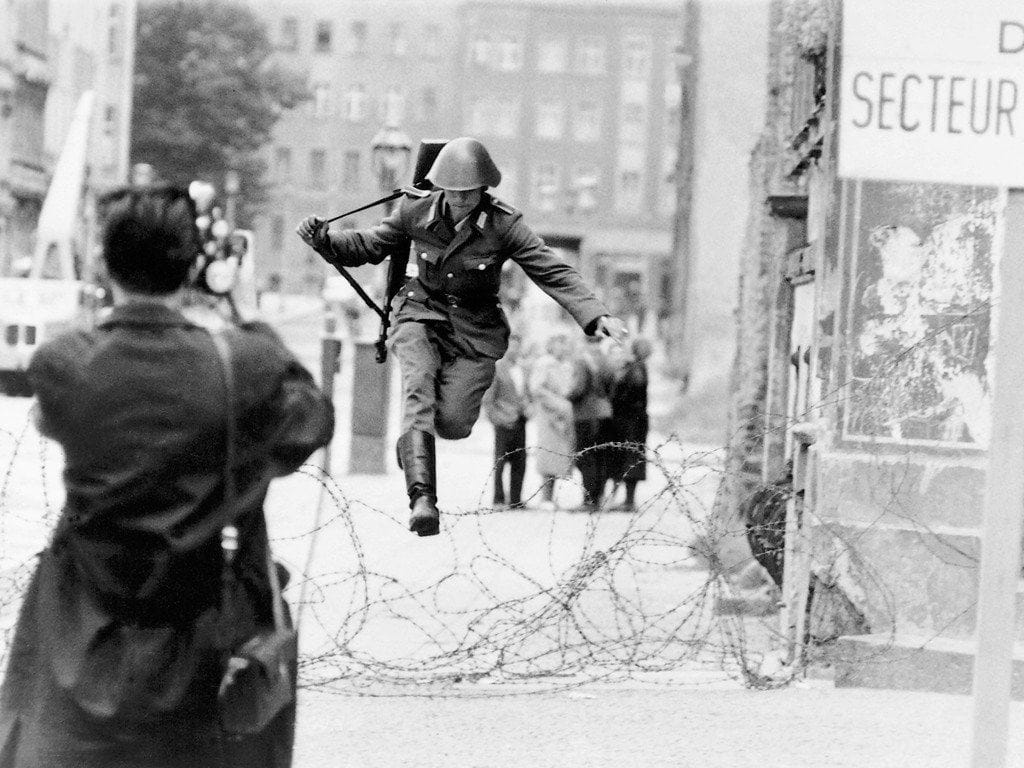
I have been thinking a lot about this question “Is anything worth fighting for anymore?”
Is one war more noble than another? One cause more worthy than another? Or does it just depend on which side of the fence you happen to be on?
Before I continue, I want to mention this is another one of my “controversial” essays. It isn’t easy to write them. I am sure I would be much more popular if I refrained. Increasingly, I’ve been receiving troubling messages, mostly by email. One recent message was from someone who claimed to be a pathologist. He knew the date of my birth and after announcing he hated “Zionist Nazis with a passion”, said “I wouldn’t want to deprive you of anesthesia in your upcoming surgeries,” as well as during my “leg amputation.”
I receive messages with foul language, insulting content, but this was by far the creepiest one. I don’t say this to be ghoulish. I just want to give some insight to my readers and listeners as to what goes on behind the scenes.
It goes without saying that this won’t stop me from continuing with my writing. It just makes me more determined.
And so, let’s continue.
It is no surprise that young people protest against war and old men promote it. It’s young men who have to fight in the wars, after all, while old men dream of one more taste of glory before their own deaths. But war is a reality. We instigate war, we are pulled into war against our will, we can be the most ardent pacifists who then find ourselves defending our families, our honor, our country out of necessity.
Is it all just propaganda fed to us by elites? Should we stop and say enough is enough? That would be nice. But what would the consequences be of such capitulation? Do we have actual enemies who seek our downfall who would then take advantage of our weakness? Is it foolish or kind to welcome the enemy into our midst?
The photo above was taken in April of 1945 by Major Clarence Benjamin. It portrays a train of 2,500 Jewish prisoners who were liberated by allied forces.
I can never begin to imagine what the woman in the forefront of the photo must have felt like, staring ahead with such incomprehensible joy. I can close my eyes and put myself in the scene. But I can never feel what she must have felt. Or what Major Benjamin and the soldiers with him must have felt. I am sure in those moments, all the pain and suffering of war fell away, and it became worth it. How many had those soldiers killed before they liberated these desperate people? If they hadn’t killed the enemy, these prisoners would have gone to the gas chambers. The enemy had families too. They probably didn’t want to be there any more than anyone else. How to make sense of it all?
For whatever reason, being human on this planet means that it is through the greatest hardship, the most horrific suffering, that we find out what we are made of. The best or the worst of ourselves. The yin and the yang, the good and the bad.
Yes, good and bad are real. It isn’t just made-up nonsense. If we stop being able to recognize what is good and what is bad, if it all just becomes someone’s opinion, then how do we ever find our way through the maze? How do we ever illuminate the darkness without the light of truth to guide us?
Think of it. One moment, you can be a nobody. Just doing your job. The next moment, you can make a choice to become a coward or a hero. The consequences of that choice can change the course of your life and the lives of everyone around you forever. It so often takes monumental courage, sometimes in the face of hatred or even death, to do good in this world. Have we forgotten what it means to be brave?
There are few who dispute that the Vietnam War was a terrible mistake. Well, that’s an understatement. It was so wrong in every way. We are still paying the price for that war in the drug addiction of millions of Americans.
How about World War II? Should the United States have not entered that war?
I’m not answering the questions here, I’m just asking them.
What would have happened if the US had stood on the sidelines? Should we have abandoned our allies, left Britain, France and the rest of Europe, to the Nazi forces? Now, Russia is our foe. But where would any of us be without the sacrifice they gave?
According to Britannica.com, an estimated 40,000,000 to 50,000,000 people died during World War II. Among the Allied powers, the Soviet Union suffered the greatest total number of dead: perhaps 18,000,000. An estimated 5,800,000 Poles died, which was 20 percent of Poland’s prewar population. About 420,000 Americans died. Among the Axis powers, there were about 4,200,000 German deaths and about 1,972,000 Japanese deaths.
Look at those figures. Americans know so little about suffering compared to other countries. One of the reasons why we suffer fewer deaths is because we are the most powerful nation on earth. We are also isolated on our own continent with a benign Canada above and a weaker Mexico below. It is unlikely we will be overrun by marauding armies. Do we realize how lucky we are?
Apparently not. Why aren’t we united in recognizing the invasion going on at our borders? Any other nation would see it and not stand for it.
Because of our power, the United States finds itself in the position of being the world’s police force. Should Americans be proud of our powerful position, or should we be ashamed? If your answer is you think we should stay out of every conflict beyond our borders, would you be willing to stand behind your words and give up our powerful position and live with the consequences? What would those consequences be?
How about this war in Gaza that threatens to expand. Should the United States abandon Israel? What would the consequences be? Is it of no importance to stand by the one free country in the Middle East? I suppose many people do not believe Israel is free. They believe it is an apartheid state that needs to be dismantled. If that happened, what would be the fate of the Jews in Israel?
Is Israel evil just because it is strong, it suffers less casualties and it has won every war against its opponents? Where would Israel be without the Iron Dome? Is it just “not fair” that Israel has an Iron Dome and Gaza doesn’t?
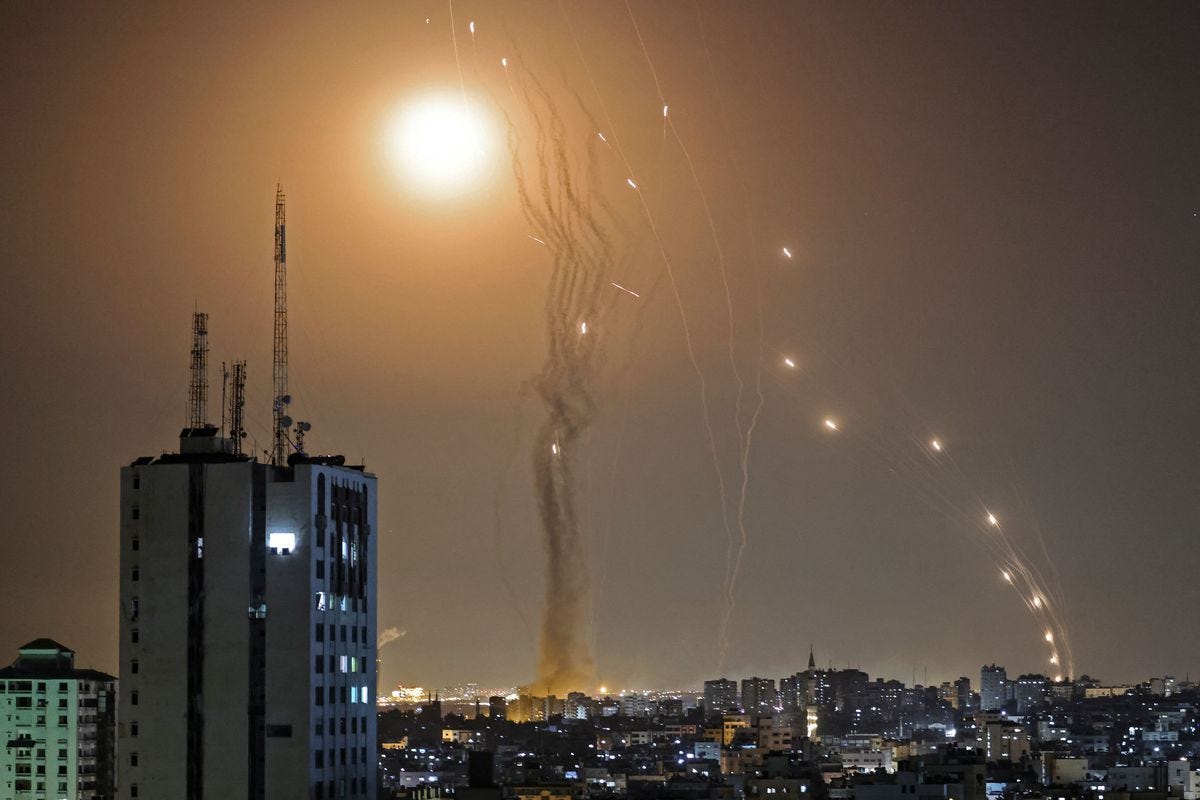
Should the United States not show its might in the Red Sea. Should it just sit back while Houthi militants terrorize ships and disrupt shipping supplies? Is Iran our foe? Should we not stand up to Iran?
A Jewish friend of mine posted this on Facebook and I thought it raised so many important points related to these questions. I am putting it here:
Is Netanyahu to blame for Gen Z’s hatred of the Jewish state?
By Rafael Medoff
Young Americans are turning against Israel, and that’s Israel’s fault, says New York Times columnist Ezra Klein. Is he right?
In a major January 27 op-ed, Klein pointed to a recent poll showing only 27% of Americans aged 18 to 29—known as “Gen Z”—are more sympathetic to Israel than to the Palestinian Arabs, as compared to 63% of Americans who are 65 or older.
According to Klein, that’s because of the policies of Prime Minister Benjamin Netanyahu, since young Americans “know only Netanyahu’s Israel.”
Does that mean all Gen Zers were pro-Israel when the left-of-center Yair Lapid was prime minister fourteen months ago?
Hardly. The real reason for hostility toward Israel among that age bracket is their ignorance of the history and facts of the Arab-Israeli conflict, not the specific polices of a particular prime minister.
Israel is not to blame if many young people choose to base their views on misleading Instagram photos, biased college professors, and radical ideologies that falsely paint Israel as a “white supremacist” state.
Nor is ignorance among the younger generation about foreign affairs a new problem in America. President Franklin D. Roosevelt was bothered by it, too.
In the 1930s, polls found 63% of college students favored unilateral American disarmament and many thousands of them signed a public pledge declaring, “We will not support the U.S. government in any war it may conduct.”
They couldn’t be bothered to read up on what was happening in Nazi Germany and the threat Hitler posed to world peace.
They were worried about being drafted.
They preferred sweet fantasies of peace to the reality of a world headed for war. And some just wanted to mimic “what the cool kids were doing”—they saw that many British university students were signing the Oxford Pledge, vowing that “under no circumstances” would they “fight for [their] king and country.”
In 1934, 25,000 American college students took part in a one-hour walkout from classes to demonstrate their opposition to U.S. involvement in any war.
The strike mushroomed to 175,000 participants in 1935, then 500,000 in 1936— nearly half the national college student population.
The student antiwar movement began to crack when communist-aligned students changed their position—again and again—not as a result of studying the facts but out of obedience to their party.
For them, ignorance was truly bliss.
In the early 1930s, the Soviet Union preferred that America keep out of European affairs, so their followers on U.S. college campuses promoted the antiwar strike. But when the Spanish civil war erupted in 1936 and the Kremlin backed Spain’s leftwing government, its campus sympathizers suddenly dropped their calls for American isolationism.
Then when the Soviets signed their nonaggression pact with Nazi Germany three years later, their followers all went back to urging America to stay out of Europe’s conflicts.
When the Soviets invaded Finland in November 1939, American communist college students defended the attack and denounced President Franklin D. Roosevelt’s proposal for modest financial aid to the Finns.
Not long afterwards, FDR gave a previously-scheduled address to thousands of activists from the American Youth Congress—including many of his communist critics. He decided to give them a piece of his mind.
The students’ claim that aid to Finland would “force America into an imperialistic war” was, the president said, “unadulterated twaddle.” He repeated that slap for emphasis. Roosevelt called their position “about the silliest thing that I have ever heard in my fifty-eight years of life.”
Note the contrast between Roosevelt’s response to his youthful critics and the recent responses by President Joe Biden to pro-Hamas protesters.
On two occasions when hecklers shouted at Biden over Gaza, he responded that he was pressuring Israel to slow down its actions against Hamas and to withdraw from Gaza.
He treated the protesters’ shouts as reasonable, persuasive arguments and sought to convince them he was already doing his best to implement their demands.
Not Roosevelt. He considered his pro-Soviet student critics to be ignoramuses, and told them so.
Despite audible boos from the crowd, he admonished the students that their positions were “based perhaps on sincerity, but, at the same time, on 90 per cent ignorance” of the subject matter.
“There is room for improvement in common-sense thinking and definite room for improvement in the art of not passing resolutions concerning things one doesn’t know anything about,” the president said. He characterized his student critics as “young people [who] get a smattering of the subject from two or three speakers who themselves have but a smattering on the subject.”
Has the political climate on America’s campuses changed very much since then?
Whether Communist Party members then or Israel-haters now, campus political activity is often steered by a handful of ideologically-driven militants.
Particular social, economic, or political circumstances create opportunities to attract sympathetic students—not because many students are deeply acquainted with the relevant history, but precisely because they are not.
Probably very few American college students in the 1930s had read Mein Kampf; probably very few today are aware of the discovery of Arabic-language copies of Mein Kampf in Gaza.
Those members of Gen Z who are marching for Hamas or telling pollsters they oppose Israel are driven by a variety of motives.
For many, old fashioned ignorance or personal factors such as a desire to join a popular cause may determine whether they march against Israel, as their predecessors marched for isolationism in the 1930s.
Whatever their motives, however, the real-world impact of their activities must be considered.
Their actions back then contributed to America’s aloofness in the face of Hitler’s outrages against the Jews and fascist aggression in Spain, Ethiopia, and China.
Their actions today are undermining America’s support for an ally fighting for its very survival.
Dr. Medoff is founding director of The David S. Wyman Institute for Holocaust Studies and author of more than 20 books about Jewish history and the Holocaust.
Is it possible we have become so soft and comfortable, that we have forgotten what it means to stand up against the enemy? Who is the enemy? Is it all just a “false flag”, a “psyop”?
In the photo above, the East Germans were trying to prevent this young woman from crossing over to freedom. Once she crossed the white line, there was nothing the East German soldiers could do. You can see the face-off between the West Berlin policemen and the East German soldiers. Did one side represent freedom and the other side oppression? Or was it all the same? Does it really matter who is right and who is wrong. Can’t everyone be right? Can’t your perception of evil be my good? How dare you tell me what is true and what isn’t. Isn’t it all about “my truth” now?
I will give the obvious answer to these last questions. It was very clear which side of the white line was right and which side was wrong.
I know, because I stood on both sides of that white line in 1967. I will never forget how terrifying it was to cross from West Berlin into East Berlin and look back at freedom.
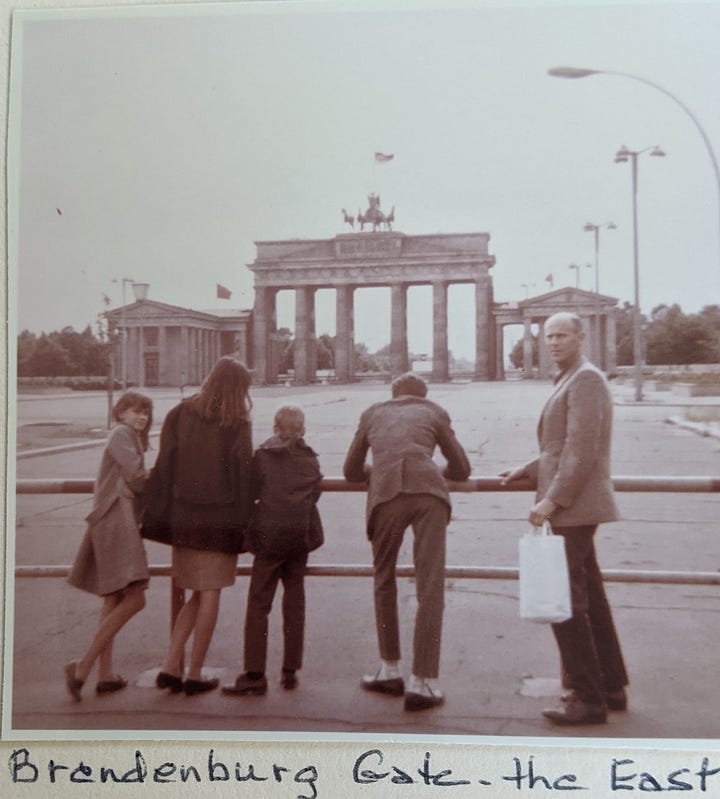

Above you can see a photo of Bradenberg Gate from my childhood and then one taken by my son just this last Christmas. I was so touched he would take this photo, knowing how much it would mean to me.
Illegal immigrants aren’t pouring across the borders of Egypt or Saudi Arabia or China or Nicaragua or North Korea or Cuba. They want to come to America. And because we do not appreciate what we have, because we have been told we should despise ourselves, we are now on the verge of civil war precisely for this reason. Forces are gathering at our own southern borders. Our country is split in two. Dark days are ahead.
Why don’t we know what freedom means anymore? If we don’t even recognize it, how will we know when we need to fight for it? Will it only be when we’ve lost it and it’s too late?




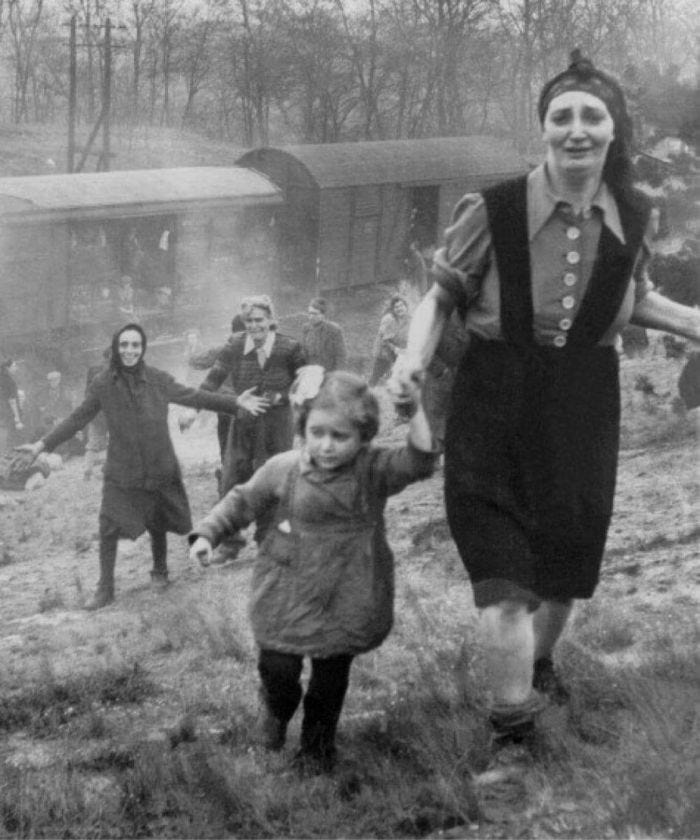
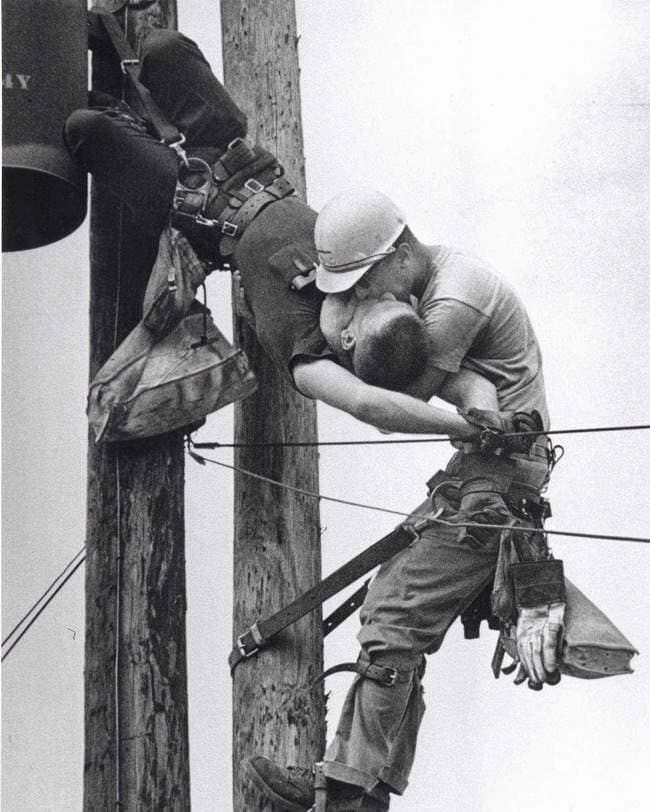
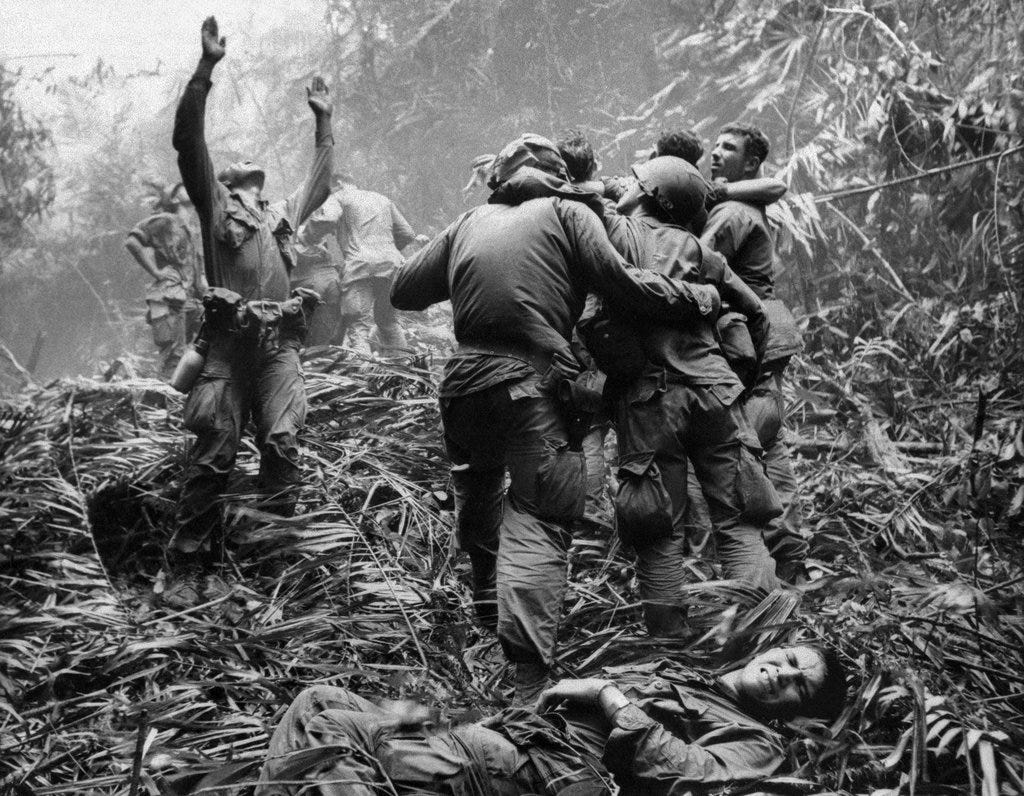
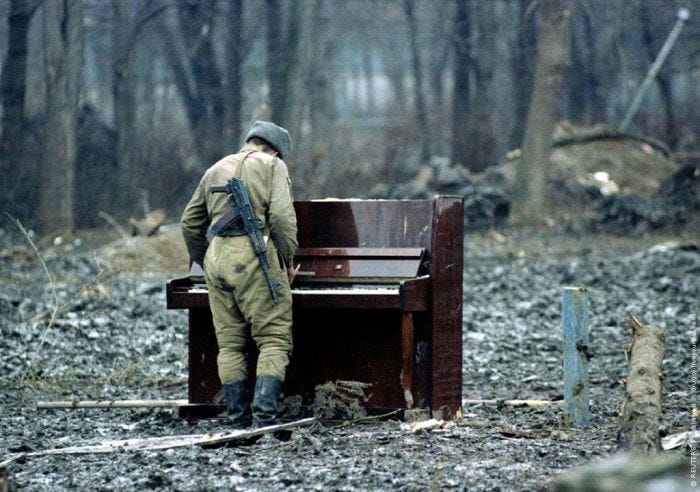
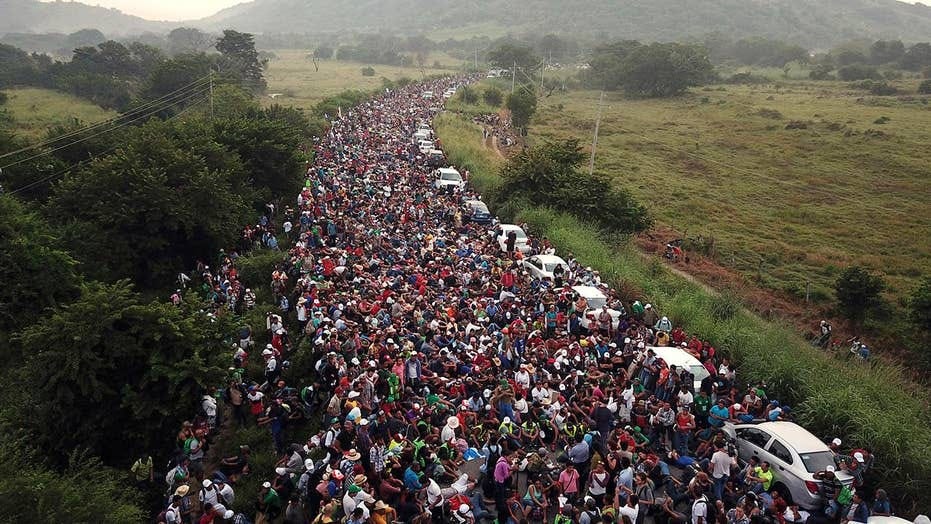
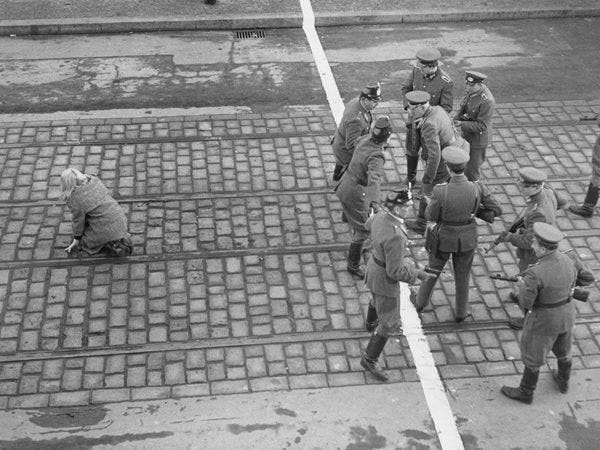
Those that cling to their Bibles and guns will save this country.
If one looks at Trump's foreign policy and his use of the military one can see the proper use of of a super power.